Unit 2: 1607 - 1754
Outline
General Timeline

General Map
Map # 1: 13 Colonies

Map # 2: Non-British Colonies
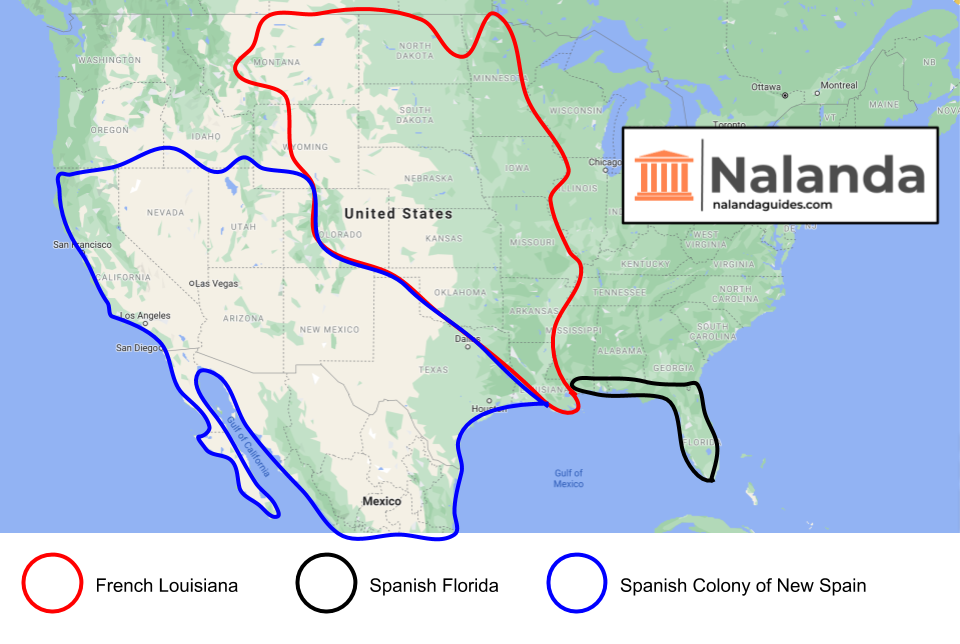
Course Content
13 Colonies
Initial British Colonies
Establishment of Jamestown
-
2 rival merchant groups (London Company & Plymouth Company) were competing for power
-
In 1606, King James I gave charters to allow London Company to colonize Southern US and for Plymouth Company to colonize Northern US
-
-
London Company quickly moved to colonize Southern part of US East Coast
-
Group of men sailed to city of Jamestown in 1607 (in present-day Virginia)
-
104 men survived journey
-
No women came, so they couldn't start families
-
John Smith was the Captain
-
-
Since this was a business enterprise, they sought gold and weren't prepared for the hardships of living in the New World
-
Jamestown was swampy & isolated, believed this would help defend against natives
-
-
The English colonists only survived with natives' help
-
Local Indians were called Powhatan Confederacy
-
Leader was named Powhatan
-
-
Natives taught them agricultural techniques
-
Growing corn, replenishing soil, etc.
-
-
Regardless, Englishmen were hostile to Natives
-
-
Many Englishmen died in the first winter, mostly due to famine and disease (malaria)
-
John Smith helped acquire food, often trading it with natives, sometimes stealing food from natives

Struggles in State Building in Virginia Colony
-
London Company was renamed Virginia company & sought to expand its territory
-
King James I enlarged its charter to include most of present-day Virginia
-
-
Virginia Company sought to bring more migrants
-
Gave free passage (from England to Virginia) to poor people, offered company stocks to those who'd pay for their journey
-
-
The Winter of 1610 (Dec 1609 - Mar 1610) caused famine, known as "The Starving Time"
-
The Indians realized that the English were a threat, so the Indians helping them & giving them good
-
Without food & help from Indians, Englishmen couldn't survive, resorted to eating rotten animals
-
Supplies couldn't come from England as one was lost in a storm, and another was trapped in Bermuda
-
When the ship lost in Bermuda finally arrived, it picked up the colonists & returned to England
-
However, on its way out of Chesapeake Bay, it met another English ship with supplies & agreed to return to Jamestown
-
-
-
Lord De La Warr (who was on the ship from England) became Virginia's first governor
-
Had harsh discipline for colonists, forced them to work
-
-
John Rolfe was a colonist who began tobacco cultivation
-
He spread the idea of tobacco cultivation, and it generated lots of wealth
-
Tobacco cultivation helped nearby settlements thrive
-
-
Initiated headright system to attract migrants
-
Gave headrights (50-acre plots) to each person who migrates to Virginia or pays for another's passage
-
-
In 1619, representatives from various communities met in Virginia, known as House of Burgesses (1st legislature)
-
First African slaves were brought to Jamestown in 1619, but they were actually regarded as slaves in late 1670s
-
Powhatan Indians tried to resist English encroachment
-
Sir Thomas Dale (next governor) kidnapped Pocahontas (daughter of chief Powhatan)
-
Pocahontas married John Rolfe, fled to England
-
Powhatan's brother, Opechancanough (next Powhatan chief), led raids on English settlers
-
Killed 347 Englishmen in a 1622 raid
-
Forced to retreat after a failed 1644 uprising
-
-
-
In 1624, King James I revoked the charter (as Virginia Company wasn't profitable), made Virginia a crown colony
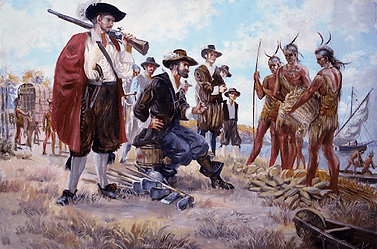.png)
Sir William Berkeley's Rule in Virginia
-
In 1642, King Charles I appointed Sir William Berkeley as Virginia governor
-
Berkeley sought to expand Virginia westward
-
After the failed 1644 uprising, natives ceded lots of territory to the English
-
English still sought to colonize more land, but negotiated a treaty line with the natives
-
-
Due to rapid population expansion, Indians didn't have much territory
-
Many former indentured servants completed their terms & were freed, so they needed their own land
-
After English Civil War (1642-1649), many defeated opponents came to Virginia in exile
-
In 1652, English reserved 3 Virginia counties exclusively for Indians
-
Still, English were encroaching on Indians' land, causing many clashes
-
-
In 1670, Berkeley developed virtually autocratic rule
-
In 1670, law was changed to that only landowning men (as opposed to men 17+) could elect burgesses (parliamentary representatives)
-
Many burgesses were elected repeatedly & kept Berkeley in office
-
Overpopulated places didn't get much representation
-
Many poor people (especially former indentured laborers) were begging & stealing, didn't have much representation either
-
All of this led to Bacon's Rebellion
-
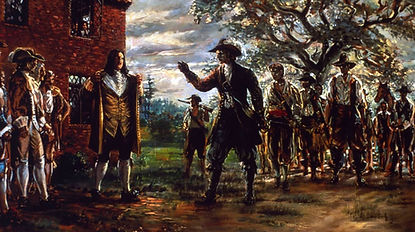
Bacon's Rebellion
Nathaniel Bacon arrived in Virginia in 1673. Had large farm in the west & a seat in government council
Since the land in the west was Indian territory, many Indians raided his land, but Berkeley didn't do anything about it
In 1675, the Doeg Indians raided the plantations of western Virginia
Bacon took his army eastward and attacked Jamestown, forcing Berkeley into exile. Bacon became governor
Berkeley hated Bacon's response and named him a rebel
Berkeley didn't do anything to suppress the Indian raid, so Bacon himself raised an army to attack the Indians
Bacon died, and British troops helped Berkeley become governor again. Indians signed a treaty in 1677, ceding more land to the English
Maryland
-
George Calvert (an English lord) wanted an American colony for all English Catholics
-
Known as Lord Baltimore
-
Believed the colony would provide refuge for the Catholics from English Anglican rule
-
-
George Calvert died before securing the charter, but his son, Cecilius, got the charter in 1632
-
Cecilius Calvert was 2nd Lord Baltimore
-
He was the proprietor (absolute ruler) of the colony & only had to pay a small fee to British nobility
-
Named the land Maryland after Queen Mary
-
-
George's brother, Leonard Calvert, was the 1st governor of the colony sent to oversee its affairs
-
Created settlement of St. Mary's
-
Had friendly relations with some natives as they believed he'd help the natives defeat their rival tribes
-
-
Leonard initiated Toleration Act (1649) to allow Protestants to come
-
Wanted more migration, so he allowed Protestants
-
Catholics were a minority, and Protestants hated Catholic rule
-
After a 1655 civil war, Protestants revoked Toleration Act of 1649 & put Protestants in power
-
-
-
Had lots of tobacco cultivation, using African slaves
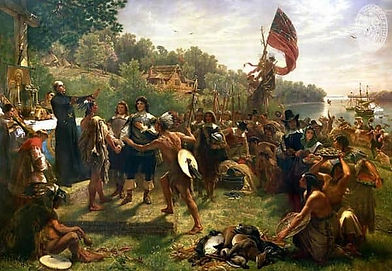
New England Colonies
Puritan Pilgrims & Plymouth
-
Puritans were Separatists as they hated the Catholic English king & sought to separate from England
-
In Sept 1620, they sailed to America on Mayflower
-
Landed in Cape Cod, settled in Plymouth (present-day Massachusetts)
-
-
Signed Mayflower Compact, establishing a civil government
-
Plymouth was outside charter of Virginia Company, so they needed their own government
-
-
Had much better relations with the natives than the people of Virginia
-
Natives helped them cultivate corn, hunt animals, and gather seafood
-
One native (named Squanto) learned English & helped them forge alliance with Wampanoag Indians
-
In Nov 1621, Wampanoags & other local Indians invited the pilgrims for a feast (known as Thanksgiving)
-
Epidemic diseases brought by Europeans wiped out many natives
-
-
William Bradford was their leader & governor
-
Distributed land, earned profits from fur trade
-
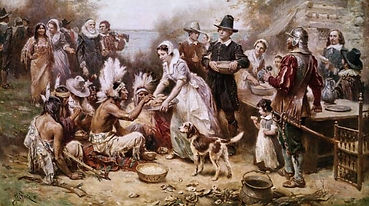
Establishment of Massachusetts
-
When King Charles I (a Catholic) took power in 1629, he further oppressed the Puritans
-
Many English Puritans wanted exile from him
-
-
Puritans acquired a charter for Massachusetts Bay Company in 1629
-
Gained present-day Massachusetts & New Hampshire
-
Believed it to be a safe haven for Puritans as opposed to a business venture
-
-
John Winthrop was the leader & set sail in 1630
-
Led 17 ships with 1000 people (mostly families)
-
Believed the colonists were only responsible to themselves and to the company instead of to the English crown
-
Established capital at Boston
-
8 main stockholders (known as "freemen") could hold office & vote
-
Later, this right was extended to all men
-
-
-
Believed in the idea of the Congregational Church
-
Unlike pilgrims of Plymouth, they didn't believe in Separatism from the Anglican church
-
Still, they showed little attachment to Anglicanism
-
-
Had independent churches throughout the colony that had their own power & stood alone
-
No centralized church
-
-
Each church had a minister, which would oversee the church's affairs & regulate life within the congregation
-
Believed in solely the Bible (no sacraments), and believed in Calvinist idea of predestination
-
Predestination: god previously chose a group of people to go to heaven and others to go to hell
-
-
Believed that they are free to worship whoever they want as a community & have no interference from any centralized church
-
Only church members could vote & hold office
-
The ministers had great power over their congregation but no special political power
-
-
The colony was stable as the families reproduced & ensured commitment to the colony
-
Natives helped with agricultural techniques
-
Religious hierarchies created political stability
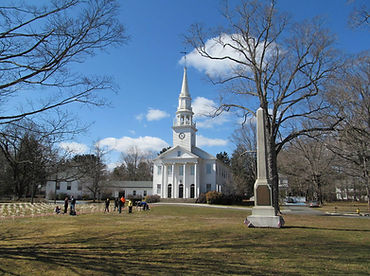
Creation of Connecticut
-
Only Puritans were given political power in the Massachusetts Colony, so many non-Puritans left
-
Thomas Hooker, the church minister of Newtown (Cambridge), led his congregation to establish the city of Hartford in 1635
-
Other non-Puritans followed him into the Connecticut Valley
-
A nearby group established the Fundamental Articles of New Haven in 1639
-
New Haven & Hartford combined to form colony of Connecticut in 1662
-

Creation of Rhode Island
-
Roger Williams believed Massachusetts colony should be separate from Anglican church
-
Williams also believed that the church shouldn't have influence over the state in the Massachusetts colony
-
Hated that only Puritan church goers could vote
-
-
Many hated Williams's views and removed him from the Massachusetts Colony
-
-
Roger Williams migrated southward from the colony
-
Took refuge among the Narragansett Indians in winter of 1635-36
-
Later established town of Providence (in present-day Rhode Island)
-
Got a charter to establish colony of Rhode Island in 1644 from English Parliament
-
Had separate church & state and religious toleration for everyone (including Jews)
-
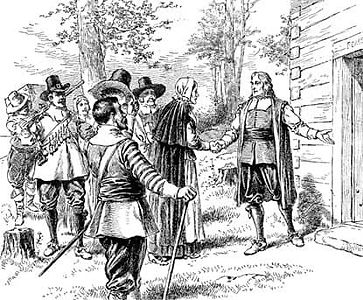
Anne Hutchinson & Creation of New Hampshire
-
Anne Hutchinson dissented the church of Massachusetts
-
Believed all church ministers are among the "non elect"
-
"non elect" is the group of people that god destined to go to hell (from Calvinist idea of predestination)
-
-
Gained a following among many women & church dissenters
-
Gained enough support to prevent re-election of John Winthrop as governor in 1636
-
In 1637, Winthrop was elected governor and tried Hutchinson for heresy, banishing her to New York where she later died
-
-
Followers of Anne Hutchinson sought exile in New Hampshire & Maine
-
John Wheelwright (a church minister who supported Hutchinson) led his congregation to Exeter, New Hampshire
-
Other followers of Hutchinson migrated to present-day New Hampshire and Maine
-
At the time, New Hampshire & Maine were under government of Massachusetts
-
New Hampshire became its own colony in 1679
-
Maine became its own state in 1820
-
-
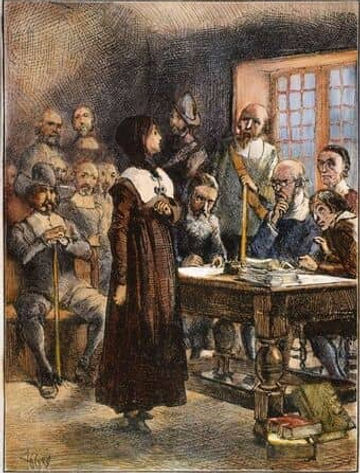
Pequot War & King Philip's War & Indian Battle Techniques
-
Pequot War was a war between English & Pequot Indians over trading rights with Dutch in New Netherland colony
-
Occurred in Connecticut Valley from 1636-1638
-
English allied with Mohegan & Narragansett Indians, the rivals of the Pequots, against the Pequots
-
English Captain John Mason set fire to the Pequot fort, causing hundreds of Pequots to die
-
Remaining Pequots were sold as slaves, nearly wiping out the Pequot population
-
-
New European guns helped the Indians
-
Miles Standish introduced the flintlock rifle, which was much more efficient than the older matchlock rifle
-
Many Indians adopted the new technology, but most Englishmen were to lazy to upgrade their guns
-
Some Englishmen taught the Indians how to use flintlock rifles
-
-
-
Indians built large forts to protect themselves
-
Narragansett built Great Swamp of Rhode Island in 1675, the site of a bloody battle in a war against English
-
-
King Philip's War, beginning in 1675, was one of the deadliest wars (this war is described below)
In 1675, Wampanoag Indians (under leadership of King Philip, known as Metacomet among the Indians) tried resisting English encroachment on their land
Used guns to destroy 20 Massachusetts towns & kill 1000 people
English fought back starting in 1676. Praying Indians (Indians that converted to Christianity) helped spy on Indians & guide English into Indian villages
As Wampanoag alliance fell apart, English easily crushed the Wampanoag. English executed many Wampanoag leaders & sold others into slavery in West Indies
Mohawk Indians (rivals of Wampanoag) helped English. They defeated Metacomet (Wampanoag ruler), causing his alliance with his fellow tribesmen and the neighboring tribes to fall apart
Restoration Colonies
English Civil War & Stuart Restoration
When King James I died, King Charles I took over in 1625
King Charles I dismissed Parliament from 1629-1640 and claimed autocratic rule (without Parliament's help)
Charles I called Parliament again in 1640 but kept dismissing it sporadically until 1642
After Cromwell died, King Charles II (son of Charles I) became king in 1660. Charles II restored autocratic rule, giving Parliament little power (Stuart Restoration)
In 1649, after the English Civil War (1642-1649), the Roundheads defeated the Cavaliers (Charles I's army), and Oliver Cromwell became king, giving Parliament more power
In 1642, Parliament organized an army called Roundheads, led by Oliver Cromwell, against Charles I to protest his autocratic rule
-
King Charles II was Catholic but he promoted religious toleration
-
Charles II created proprietary colonies in the US
-
Proprietary colonies were run by proprietors, who made a permanent settlement in the colony for a long period of time
-
Private Companies (the previous colonies) would quickly colonize the lands to ensure commercial success, which often failed
-
These included New York, New Jersey, Pennsylvania, North & South Carolina, Delaware
-
Creation of North & South Carolina
-
In 1663 & 1665, King Charles II gave 8 proprietors charters to the land of Carolina
-
Carolina was Latin for "Charles"
-
Encompassed present-day North & South Carolina
-
-
Gave political freedom to its colonists as a representative assembly made laws
-
The proprietors established Anglicanism but tolerated all Christians to promote migration there
-
Wanted migration not just from England but from other American colonies as well
-
These efforts failed, many proprietors gave up
-
-
One original proprietor, Anthony Ashley Cooper, believed in funding migrants to travel from England
-
Thus, many people arrived from England to the Carolinas in late 1600s
-
Capital city of Charles Town (present-day Charleston) was founded in 1690
-
-
Anthony Ashley Cooper created Fundamental Constitution for Carolina (1669)
-
Cooper had the title Earl of Shaftesbury
-
Inspired by John Locke, promoted land distribution & social order
-
-
In 1719, when Cooper died, the colonists took power of Carolina as the original proprietors couldn't maintain social order
-
Northern & Southern regions developed very differently, so Charles II divided Carolina in 1729
-
North had many subsistence farmers & little slaves
-
Had few wealthy people
-
-
South had lots of slaves and many wealthy landowners
-
Developed close ties with Barbados to acquire slaves (a British colony in Caribbean with a thriving slave market)
-
-
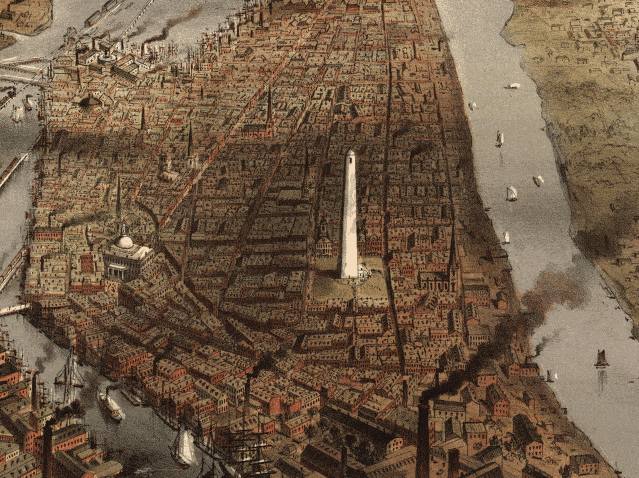
Creation of New York
-
In 1664, King Charles II gave his brother, James (Duke of York), a charter that encompasses present-day New York & New Jersey
-
Dutch had a presence in New York that the English sought to remove
-
Dutch-sponsored Henry Hudson sailed down Hudson river into New York City, called it New Amsterdam (1624), creating colony of New Netherland
-
In 1664, Richard Nicolls led the English fleet to capture New Amsterdam
-
New Amsterdam was poorly defended, and governor Peter Stuyvesant surrendered
-
-
English fully established control by 1674, renamed it New York as James was the Duke of York
-
-
New York had lots of diversity & a high wealth gap
-
Many Dutch, English, Scandinavians, Germans, French, African slaves, etc. all lived there
-
Many wealthy people (including Dutch patroons (wealthy landowners), wealthy English landlords, etc. were all loyal to James
-
James remained in England (like many other proprietors) & appointed a governor in New York
-
.jpg)
Creation of New Jersey
-
James's charter included present-day New Jersey, but his colonists only settled in New York, so he later created Colony of New Jersey
-
Gave New Jersey to Sir John Berkeley & Sir George Carteret (who were also proprietors of Carolina)
-
Carteret named the land New Jersey as he was born on the British island of Jersey
-
New Jersey couldn't generate any profits, so Carteret made a royal colony in 1702
-
-
Unlike New York, New Jersey was much poorer
-
Mostly agriculture-based with many small farmers
-
Had no wealthy landowning class
-
Had no major cities
-
.jpg)
Creation of Pennsylvania
-
Pennsylvania was a Quaker Colony
-
Quaker (known as Society of Friends) was founded by George Fox & Margaret Fell
-
Were a group of Puritans, but didn't believe in Calvinist idea of predestination
-
Believed everyone had an "inner light" that would guide them to salvation
-
-
Had no hierarchy or central church, only had occasional meetings of congregations
-
Never fought any wars, believed in nonviolence
-
Persecuted in England & many American colonies
-
-
William Penn, the son of a wealthy Irish landlord, sought to create a colony for Quakers
-
Penn converted to the Quaker religion
-
He had some land in New Jersey, but after his father's death, he inherited more land as well as a claim of debt owned to him by the king
-
Charles II was short on cash, so instead of paying the debt, he gave him a charter to Pennsylvania
-
Pennsylvania was rich in natural resources & much larger than England
-
-
-
Pennsylvania was not profitable, yet many people migrated there
-
Capital of Philadelphia (means "Brotherly love") was founded in 1682
-
Had rectangular streets like Charles Town, setting the example of future US cities
-
-
Penn died in 1718 while in poverty
-
-
Penn believed his land belonged to the Indians, so he reimbursed the Indians for the land they lost
-
Thus, he never had any conflict with the Indians
-
-
Many colonists hated the autocratic rule of Penn
-
Believed he was unresponsive to their needs
-
Signed Charter of Liberties, which creates one legislative assembly
-

Creation of Delaware
-
The Charter of Liberties (signed by William Penn) allowed the 3 poorer counties of Pennsylvania to have their own legislative assembly
-
These 3 counties became the colony of Delaware in 1703
-
Delaware had the same governor as Pennsylvania
-
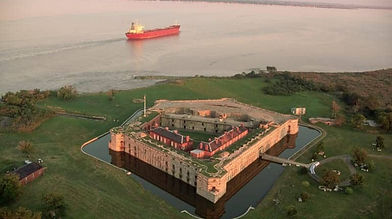
Creation of Colony of Georgia
-
General James Oglethorpe wanted a colony south of the Carolinas for the impoverished Englishmen
-
In a 1676 treaty, Spanish acknowledged the English colonies' land
-
However, in 1686, Spanish directed a group of Indians to attack the Carolinas
-
Fighting continued in the War of Spanish Succession (1701-1713)
-
Known as Queen Anne's War in England
-
-
Oglethorpe believed English debtors and impoverished people could migrate to Georgia as he hated that most of them died in jail
-
Oglethorpe wanted a colony south of the Carolinas to protect against Spanish Florida
-
-
In 1732, King George II gave Oglethorpe a charter containing present-day Georgia
-
Established town of Savannah on the coast in 1733
-
Excluded African slaves & Catholics
-
Believed Catholics would form alliances with Catholics in Spanish Florida
-
-
Brought many impoverished people from Europe, including Jews
-
-
Many hated Oglethorpe's harsh policies, so he removed some of his restrictions
-
Allowed slavery & rum
-
Removed limitation of land plot sizes
-
Gave the colony to the king later on as Georgia was very poor
-
The king created a legislative assembly there
-
-

Later Reorganization of British Empire
Reorganization of British Colonial Economy
-
To increase British wealth, the British sought to use mercantilist principles in its colonial economy
-
Believed colonies would be sources of raw materials & markets for manufactured goods
-
Believed it must monopolize trade with its colonies so no wealth flows from the colonies to non-British countries
-
This was difficult as not all British exports needed American raw materials
-
American colonies found it more profitable to trade with non-British nations
-
-
-
Britain later passed the Navigation Acts to monopolize trade with its colonies
-
First Navigation Act (1660) said that only English ships can dock at colonial ports
-
2nd Navigation Act (1663) said that all ships from the colonies must pass through England on their way to Europe
-
3rd Navigation Act (1673) put customs officials to enforce the first 2 acts
-
Navigation Acts allowed for the American shipbuilding industry to thrive as the colonies could build their own ships (which were still British)
-
Also allowed for the British government to subsidize expensive colonial industries as those industries significantly helped the British
-
%20(1).png)
Creation of Dominion of New England
-
King Charles II sought to diminish the power of Massachusetts colony as it was acting like its own country
-
Made New Hampshire independent from Massachusetts in 1679
-
Since Massachusetts was defying the Navigation Acts, Charles II revoked its charter and made Massachusetts a royal colony in 1684
-
-
In 1686, King James II created the Dominion of New England, encompassing all of the northeastern colonies
-
New York & New Jersey joined in 1688
-
James II appointed a single governor for the entire Dominion, Sir Edmund Andros
-
Many despised Andros as he strictly enforced the Navigation Acts
-
-

Glorious Revolution
-
Many hated King James II as he was Catholic
-
He appointed Catholics to British government
-
He also tried to limit authority of Parliament & proclaim himself an absolute monarch
-
non-Catholic Parliamentary members feared the Pope would take over England & impose Catholicism
-
-
Parliament voted in 1688 to remove James II from office
-
James II didn't want another bloody battle (like the English Civil War), so he peacefully agreed to give up the throne
-
It's called the Glorious Revolution as he peacefully gave up the throne
-
-
His daughter, Mary II, and her husband, William of Orange, became the next monarchs
-
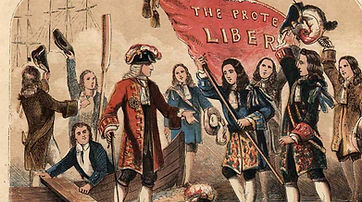
Effects of Glorious Revolution
-
In Massachusetts, upon hearing about the Glorious Revolution, they abolished the Dominion of New England
-
Imprisoned Sir Edmund Andros
-
Made Plymouth part of Massachusetts in 1691, made it all a royal colony
-
New charter reinstated the General Court (the colony's legislature), but allowed English King to appoint governor
-
Requirement to vote became property ownership instead of church attendance
-
-
In New York, the middle class overthrew the upper class regime
-
Captain Francis Nicholson was governor of New York & lieutenant of Edmund Andros of New England
-
Supported the wealthy class
-
-
Jacob Leisler, a New Yorker, married into a wealthy family but never actually received the wealthy benefits that others received
-
He led opposition to Francis Nicholson & raised a militia and took over in 1689
-
He was inspired by Glorious Revolution & overthrow of Andros in New England
-
-
In 1691, Monarchs William & Mary chose a new governor, Nicholson was charged with treason
-
-
In Maryland, the people overthrew Lord Baltimore (a Catholic) as they believed he sided with James II in the Glorious Revolution
-
John Coode led a revolt & drove Lord Baltimore out of office in 1689
-
Lord Baltimore was residing in England
-
-
In 1691, William & Mary gave Maryland a new charter, removing authority of Lord Baltimore
-
Anglicanism was established (instead of Catholicism like before)
-
-
Only in 1715, the 5th Lord Baltimore regained authority of the land as he was an Anglican
-
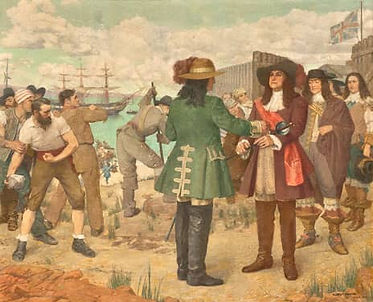
Other General Patterns of Colonialism
Tobacco Production
-
Tobacco first came about when Christopher Columbus observed the natives of Hispaniola smoking through a pipe called tobago
-
Grew popular in Europe
-
King James I regarded it as barbaric like the Indians
-
-
In 1612, John Rolfe (a Virginia Colonist) planted tobacco in Virginia
-
Yielded high profits in Europe
-
Others started to plant tobacco as well
-
Tobacco required lots of land, so the English had to push onto lots of Indian land
-
%20(1).png)
Interactions between Indians & English
-
Indians were crucial for the survival of the English
-
Indians taught the English how to grow food
-
English weren't used to the Virginia climate
-
Indians provided advice on agricultural methods, teaching them how to grow corn & clear fields
-
Taught them that growing beans alongside corn replenishes the soil
-
-
-
Some Indians converted to Christianity (known as Praying Indians)
-
English also traded with the Indians, which was crucial to English economic success
-
Middle Grounds were places in which Indians & English shared roughly the same land
-
At first, English & Indians were confused about each other's traditions
-
Indians didn't understand English ideas of the nation-state; English didn't understand Indian ideas of kinship
-
English later learned to treat the Indian leaders with respect & give gifts to the Indians
-
English & Indians lived in close intimacy here
-

Non-British Colonies:
Spanish Colonies
Spanish Southwest America (New Spain)
-
Many Spanish missionaries & independent ranchers moved north from Mexico City into present-day US
-
Mostly sought to escape the centralized and strict authority within Mexico
-
New Mexico was the most prosperous Spanish settlement in Western US
-
-
Spanish settlers from Baja California sought to move north into California (1760s)
-
Catholic missionaries built missions along the Pacific Coast to convert the natives
-
Missions had presidios (forts) alongside them with Spanish soldiers to protect the priests from hostile natives
-
-
Spanish diseases killed many of the natives
-
Spanish forced the natives to perform agricultural labor, which also killed some of them
-
-
Because French established a presence in Louisiana, Spanish built a post at San Fernando (present-day San Antonio to defend (1731)
-
Spanish had a difficult time converting the natives of Arizona as they weren't sedentary

Spanish Florida
-
Spanish established post at St. Augustine, Florida, in 1565
-
First Spanish settlement in the US
-
-
After English established Jamestown (1607), Spanish built more posts in Florida/Georgia area to defend
-
English hated this & attacked St. Augustine in 1688
-
-
Spanish & English constantly fought over Florida
-
Spanish offered to free some slaves in Carolina if they help the Spanish defeat the English
-
Due to the constant fighting, many Spanish settlers in Florida left
-
Eventually, English took over Florida after 7 Years' War (1763)
-
-
English later founded Georgia to protect against Spanish Florida
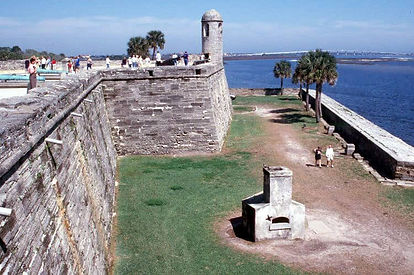
French Colonies
-
In 1608, Samuel de Champlain founded the City of Quebec (present-day Canada)
-
French settlers were mostly fur trappers
-
Would kill beavers to get their fur (which was a luxury good)
-
Traded fur with Indians, developed close relations with Indians
-
-
Later, in 1680s, French mariners sailed down the Mississippi river, landing in Louisiana in 1682
-
Named the land Louisiana after the French King, Louis XIV
-
Threatened Spanish holdings in Florida and Texas
-
-
French also had a few colonies in the Caribbean

Dutch Colonies
-
In 1609, Dutch-sponsored explorer Henry Hudson landed in North America
-
First landed in Hudson Bay (named after him)
-
Later sailed down Hudson river (also named after him) into present-day New York City
-
Named the city New Amsterdam in 1624
-
The area around New Amsterdam (present-day New York State) became colony of New Netherland
-
-
-
Colony of New Netherland was disrupting English colonial plans
-
The colony was right in the middle of the Northern & Southern English colonies
-
English sought to conquer it
-
-
In 1664, English captain Richard Nicolls led his fleet to capture New Netherland
-
Fully established English authority there in 1674
-
Renamed it New York (after James, the Duke of York)
-
-
Dutch also had a few colonies in the Caribbean
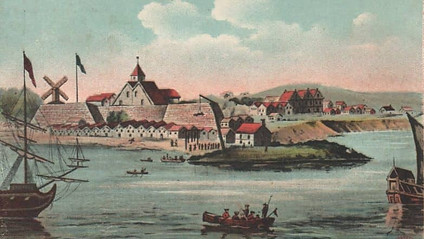
Caribbean Islands
-
Caribbean islands were major settlements for the Europeans
-
Britain, Spain, Portugal, France, Dutch all had settlements here
-
Indians were mostly wiped out of European diseases, so they caused little disruption
-
Spanish claimed the entire Caribbean, but only had real settlements in Cuba, Puerto Rico, and Hispaniola
-
-
After Spain & Netherlands went to war in 1621, Spanish navy was distracted, so English took over some more islands
-
English colony of Barbados was really important
-
-
Slavery was really common in the Caribbean
-
Almost half of the slaves imported from Africa came here
-
English sought to grow sugarcane, tobacco, and cotton, all of which were arduous tasks
-
English indentured servants didn't want to come due to the harsh working conditions
-
Thus, English imported many African slaves, many of which died due to harsh working conditions
-
This stimulated the demand for more slaves
-
-

Colonial Society & Economy:
Colonial Population
-
Indentured servants were people who'd migrate to the Americas to work for a certain amount of time then become free
-
Some chose voluntarily to escape horrible living conditions of England
-
Some were convicted criminals
-
Once freed, they often struggled to make a living
-
Government granted them some land, but they didn't have much wealth overall
-
Some resorted to begging
-
-
In late 1670s, as British prosperity increased and its population stabilized, indentured servants started to decline in number
-
-
Women were outnumbered by men, giving them more power
-
In the south, 25% of population were women
-
Death rate was worse in the south
-
Women had more power as they were scarce and could choose their own husbands
-
Their husbands often died earlier than them, so the wife would be able to manage the family estate on her own
-
Women often bore a lot of children, and about 50% died before adulthood
-
-
In the north, women were a bit more numerous and less powerful than southern counterparts
-
Women lived longer, life expectancy was higher in the north
-
Women bore a lot of children, but child mortality was lower
-
Puritans believed women should be subservient to men
-
-
-
Death rate was high initially, but it decreased later on, and the population grew naturally via births
-
Many European nations sent immigrants here
-
Many French, German, and Irish Protestants came to the Americas to escape Catholic rule
-
Germans were known as Pennsylvania Dutch
-
City of New Bern (est. 1710 in NC) also attracted many Germans
-

Slavery
-
Slavery became common as British needed more laborers
-
Portuguese initially started slave trade
-
Other European nations later went to Africa to get slaves
-
Europeans would give guns to African kingdoms to raid other kingdoms to get slaves
-
In exchange for these slaves, the kingdom that captured them would get more guns
-
-
Slaves were needed because the natives were largely exterminated of European diseases
-
Also, supply of indentured servants was low
-
-
Slaves would be cramped into a ship to travel across Atlantic, known as the "Middle Passage"
-
25% of slaves died here
-
-
Less than 5% of total imported slaves went to the 13 colonies
-
The remaining slaves went to Brazil or the Caribbean (about 50-50 split)
-
-
Initially, slaves were brought from Caribbean to the 13 colonies, but slaves were imported directly from Africa in 1670s
-
Royal African Company of England initially had monopoly over slave trade
-
Later, independent merchants followed, increasing the supply of slaves
-
-
-
Slavery was really cruel
-
"Slave codes" were passed to limit their power
-
Sometimes engaged in sexual contact with their masters
-
Had some informal religion and culture, harmonized African traditions with Christianity
-
Had informal families, could be broken up as the masters sell family members
-
Slaves were beaten for working poorly
-
Sometimes had artisanal jobs
-
In Stono Rebellion (1739), 100 slaves got weapons & killed whites, but the whites later crushed it
-
-
Slaves contributed significantly to the economy
.jpeg)
Colonial Society & Lifestyle
-
Plantations were really common, especially in the South
-
Very risky as prices for goods fluctuated
-
Often had one house for the master, some slave cabins, barn, chapel, etc.
-
Sometimes, slaves did household chores, so white woman could spend time with family
-
Also employed small white landowners who didn't have enough wealth for their own land
-
-
Most New England cities were Puritan communities
-
Puritan communities believed in a centralized community life instead of individual life
-
Ruled by a group of adult males
-
Adult males would distribute land among all their sons once they die
-
Thus, later generation would have little land
-
-
New towns were formed when people would move farther away from city center due to land scarcity
-
-
Accusations of hysteria & strange behavior led to witchcraft trials throughout New England
-
Believed some people worshipped the devil
-
Often widowed women w/ few children
-
-
Such people were convicted of witchcraft, tried in court, and potentially executed
-
In Salem Witch Trials (1690s), about 20 supposed witches died
-
-
Colonial cities were the center of industry, while rural centers were the centers of agriculture
-
Wealth gap was huge at the time, and more poor people actually lived in rural areas than cities

Colonial Economy
-
Southern economy was agricultural
-
Tobacco generated huge profits in Europe and was commonly grown in the south
-
Rice was also grown, especially in South Carolina
-
Involved laborious work
-
-
Indigo was also cultivated in the South, especially South Carolina, creating blue dye
-
Eliza Lucas brought indigo from the island of Antigua to the 13 colonies
-
-
-
Northern economy was more industrial
-
Less favorable climate for agriculture
-
Lots of craftsmanship and shipbuilding
-
Saugus Ironworks pioneered iron extraction
-
Used a furnace to smelt iron ore
-
Had a financial problem and closed
-
-
Peter Hasenclever (German man) founded a large ironworks company in New Jersey
-
Most colonial cities had small ironworks companies
-
This stopped when British Iron Act of 1750 prevented these businesses from operating
-
-
Intercolonial business was hindered by inadequate transportation
-
Extracting industries (lumber, etc.) were common
-
-
There was no currency in the colonies, so people used tobacco certificates, bartered, etc.
-
Triangular trade brought lots of prosperity
-
European manufactured goods went to Africa in exchange for slaves
-
Slaves went to the Americas
-
Cash crops cultivated by slaves were sent from Americas to Europe
-
-
A merchant class grew in New England, traded with England and other colonies
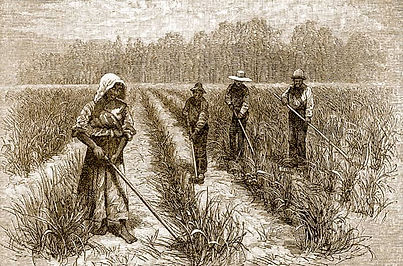
Major Colonial Societal Movements
First Great Awakening
-
Many different religions came to the colonies, and religious piety was declining
-
Westward expansion and the growth of the Enlightenment in Europe caused this
-
-
First Great Awakening happened in 1730s, a movement that taught that anyone can have a relationship with God
-
John & Charles Wesley, the founders of Methodism, preached this in Georgia
-
Main preacher was Jonathan Edwards
-
A deep Puritan, believed salvation comes from God's grace alone
-
-
Denounced books & promoted prayer
-
"Old Light" refers to old beliefs in god, "New Light" refers to the new idea of God
-

Origins of Enlightenment
-
Taught that rational reasoning advances human progress
-
Partially undermined the Great Awakening as it believed people shouldn't use God for progress
-
Came as a result of scientific discoveries in Europe that taught people to use rational reasoning
-
Benjamin Franklin, Thomas Jefferson, Thomas Paine, and James Madison were Enlightenment thinkers in the US
-
-
Enlightenment believed in promoting education
-
Harvard (est. 1636) was founded as a Puritan college but later promoted secular education
-
Other universities also promoted secular education as well
-
-
Enlightenment promoted science
-
Benjamin Franklin discovered that electricity & lightning are the same thing
-
Inoculation against smallpox was discovered
-
-
Led to idea of rational governance in the colonies
-
Previously, colonies had some laws borrowed from England (trial by jury, etc.)
-
Colonies did not have jail time and instead had other punishments like whipping, etc.
-
Jail time hinders the small workforce
-
-
Later, as the colonial governments were more focused on local interests and distant from British Parliament, the colonists resented British rule
-

Summary
13 Colonies:
When the British settled in present-day US, they established 13 colonies. These colonies were all established independently, some owned by companies, others by proprietors, and few were owned directly by the British crown. The first colony was Jamestown (est. 1607), which struggled to survive due to the lack of resources. Eventually, it got saved at the brink of collapse, developing into the thriving Virginia colony. The proprietary Maryland colony came later. Massachusetts was established as refuge for Puritans. Rhode Island, Connecticut, and New Hampshire were established by dissidents of Massachusetts. Later, Carolina was established, splitting into North & South due to economic differences. Later, New York was taken from the Dutch, and the extra land in the New York charter became New Jersey. Pennsylvania was established for Quakers, and part of it became Delaware. Finally, Georgia was established to protect against Spanish Florida. Most of these colonies had hostile relations with natives, causing the King Philip's War and Pequot War. Tobacco cultivation became really common, especially in the south.
Non-British Colonies:
Besides the British colonies, there were also other European colonies in the area. The Spanish ruled Florida and also present-day Texas to California. Meanwhile, the French had Louisiana and the land east of Spanish territory and west of Mississippi river. The Dutch originally had New Amsterdam but the English took over. In the Caribbean, the Spanish dominated, but the English later over some islands, and Barbados was the most prosperous British island in the Caribbean.
Colonial Society & Economy:
Colonial society was very different from English society. Due to the scarcity of women, women had a prominent role, especially in the south. Furthermore, indentured servitude was common as many Englishmen wanted to start a new life in the Americas but didn't have any money. As the number of indentured servants declined, the colonies increased their reliance on slavery. Furthermore, Puritan churches were the center of life in New England, and witchcraft became common in the late 1600s. People convicted people who they believed were witches, and the Salem Witch Trials led to the execution of about 20 witches. The Southern Economy was largely agricultural, while the Northern Economy was largely industrial. Furthermore, the First Great Awakening brought a revival of religious spirit, and the Enlightenment promoted rational reasoning among the colonists, eventually leading to the American Revolution.
